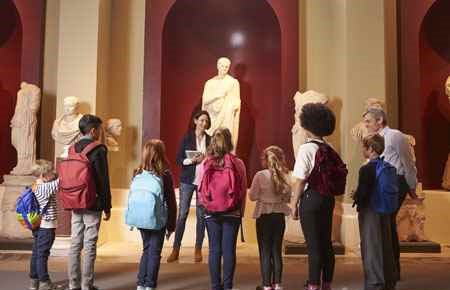
Historian
Summary
Historians research, analyze, interpret, and write about the past by studying historical documents and sources.
What they do
Historians typically do the following:
- Gather historical data from various sources, including archives, books, and artifacts
- Analyze and interpret historical information to determine its authenticity and significance
- Trace historical developments in a particular field
- Engage with the public through educational programs and presentations
- Archive or preserve materials and artifacts in museums, visitor centers, and historic sites
- Provide advice or guidance on historical topics and preservation issues
- Write reports, articles, and books on findings and theories
Historians conduct research and analysis for governments, businesses, individuals, nonprofits, historical associations, and other organizations. They use a variety of sources in their work, including government and institutional records, newspapers, photographs, interviews, films, and unpublished manuscripts, such as personal diaries, letters, and other primary source documents. They also may process, catalog, and archive these documents and artifacts.
Many historians present and interpret history in order to inform or build upon public knowledge of past events. They often trace and build a historical profile of a particular person, area, idea, organization, or event. Once their research is complete, they present their findings through articles, books, reports, exhibits, websites, and educational programs.
In government, some historians conduct research to provide information on specific events or groups. Many write about the history of a particular government agency, activity, or program, such as a military operation or space missions. For example, they may research the people and events related to Operation Desert Storm.
In historical associations, historians may work with archivists, curators, and museum workers to preserve artifacts and explain the historical significance of a wide variety of subjects, such as historic buildings, religious groups, and battlegrounds. Workers with a background in history also may go into one of these occupations.
Many people with a degree in history also become high school teachers or postsecondary teachers.
Work Environment
Historians work in museums, archives, historical societies, and research organizations. Some work as consultants for these organizations while being employed by consulting firms, and some work as independent consultants.
How to become an Historian
Although most historian positions require a master’s degree, some research positions require a doctoral degree. Candidates with a bachelor’s degree may qualify for some entry-level positions, but most will not be traditional historian jobs.
Historians need a master’s degree or Ph.D. for most positions. Many historians have a master’s degree in history or public history. Others complete degrees in related fields, such as museum studies, historical preservation, or archival management.
In addition to coursework, most master’s programs in public history and similar fields require an internship as part of the curriculum.
Research positions within the federal government and positions in academia typically require a Ph.D. Students in history Ph.D. programs usually concentrate in a specific area of history. Possible specializations include a particular country or region, period, or field, such as social, political, or cultural history.
Candidates with a bachelor’s degree in history may qualify for entry-level positions at museums, historical associations, or other small organizations. However, most bachelor’s degree holders usually work outside of traditional historian jobs—for example, jobs in education, communications, law, business, publishing, or journalism.
Pay
The median annual wage for historians was $63,680 in May 2019. The median wage is the wage at which half the workers in an occupation earned more than that amount and half earned less. The lowest 10 percent earned less than $29,760, and the highest 10 percent earned more than $114,810.
Job Outlook
Employment of historians is projected to grow 3 percent from 2019 to 2029, about as fast as the average for all occupations.
Many organizations that employ historians, such as historical societies and historical consulting firms, depend on donations or public funding. Thus, employment growth will depend largely on the amount of funding available.
Similar Job Titles
County Historian, County Records Management Officer (County RMO), Historian, Historic Interpreter, Historic Sites Registrar, Historical Interpreter, Programs Director, Research Associate, Researcher
Related Occupations
Philosophy and Religion Teacher-Postsecondary, Graduate Teaching Assistant, Archivist, Librarian, Reporter and Correspondent
More Information
The trade associations listed below represent organizations made up of people (members) who work and promote advancement in the field. Members are very interested in telling others about their work and about careers in those areas. As well, trade associations provide opportunities for organizational networking and learning more about the field’s trends and directions.
- American Alliance of Museums
- American Association for State and Local History
- American Historical Association
- American Research Center in Egypt
- Mid-Atlantic Regional Archives Conference
- Midwest Archives Conference
- Mormon History Association
- National Association for Interpretation
- National Association of Watch and Clock Collectors
Magazines and Publications
Content retrieved from: US Bureau of Labor Statistics-OOH www.bls.gov/ooh,
CareerOne Stop www.careeronestop.org, O*Net Online www.onetonline.org

